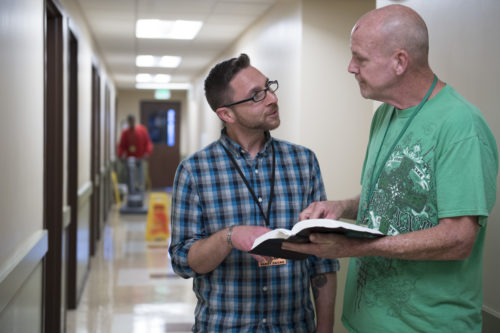Scott C., age 61, was born in San Bernadino,
California. “My father was a civil servant in the
United States Marine Corps,” recalls Scott. “I was
raised in California but moved to Maryland in
grade school. My family was a normal, churchgoing, and two-parent household. My father
started to drink more when I was in my early
teens. Suddenly, he was distant and extra strict.”
“In high school, I was one of the ‘cool kids.’
I excelled in sports and played football,
basketball, and ran track. In track, I ran the
100-yard dash and still hold the Maryland state
class C record, which I set in 1979, to this day. I
loved running and knowing that I was the best.
I was not the best at basketball or football, but
I was the best at running. It was a natural high.
I graduated from high school and received
scholarships to run in college, but I did not
want to run anymore. There was no future in
running track, and I could not make a living.”
“During my second year at college, I attended
a job fair, and they offered me a job working
with individuals with disabilities. I took the
job, and they would pay me to go to school. I
worked so hard that I was too tired to attend
class and eventually dropped out. This is where
my drinking and drugging began. I started
drinking heavily, smoking marijuana daily, and
being introduced to cocaine. I had everything,
a job, a girlfriend, and a drug habit.”
“The crack cocaine epidemic hit in the late
eighties. The desire for more cocaine was
uncontrollable. I would stay up all night, start
to miss work, and along with my roommate,
we struggled to maintain the lifestyle. In 1989,
I recognized that this lifestyle was unattainable.
I still was not an addict, just a guy that had a
crack cocaine problem. In a moment of clarity,
I understood that change was necessary. I
needed to find a woman and settle down. I
met my wife, got married, and started a family.
We had four children.”
“I was still getting high but paying the bills. I
was functioning, and in my eyes, I was still not
an addict. I stopped smoking crack and started
snorting powdered cocaine. The cravings were
not as strong. I could run out of cocaine and
not be affected. In 2000, I started snorting
heroin to come down from the rush of cocaine.
Heroin helped me sleep at first but then grew
into a dependency. I thought I was still not an
addict. I was eventually turned onto fentanyl
when it hit the streets in 2018.”
In 2019, my son was in a bad car accident,
and the doctors prescribed opiates to
help him recover. He started to become
addicted to these pills. I warned him that
he comes from a family of addiction. My
father had seven brothers, and five of them
died from alcoholism. I tried to help him,
but he kept getting high. We were close,
and his addiction separated us. One day
in 2022, his girlfriend woke up and found
him dead from an overdose.”
“To deal with his death, I went crazy
drinking and drugging. One month later,
I had lost everything and was sleeping
in my car. I was an addict. At my lowest
point, I checked into a detox facility in
Chestertown, Maryland. I graduated from
the 30-day program, and a Peer Recovery
Specialist told me he knew of a perfect
place for me to go next, Helping Up
Mission (HUM) in Baltimore. I told him
that I was not going to anyplace called a
‘mission!’ He told me that it was more
than just a mission, and to prove it, he
was a graduate.”
“When I arrived at HUM, it was better than
I had thought. During my ‘blackout’ (45
days of limited communications), some
of the guys told me about the running
club Back on my Feet, and I joined as soon
as I came from the blackout. I had only
ever run sprints in the past, and I thought
running distances would be a mess. At
first, I would walk a mile, but now I can
do three miles without a problem. I lost
weight and lowered my cholesterol. Every
time a 5k race comes up, I am there and
will be running the 5k at the Baltimore
Running Festival on October 14th. When I
am out there running, I think of the past,
and I am just as happy finishing a race in
the middle of the pack as I was winning in
high school.”
“Today, having graduated from the
Spiritual Recovery Program, I am looking
forward to getting a job, my own place,
and everything I lost – except the drugs
and alcohol!”
“To the donors, thank you for helping me
and those like me. It is only through your
unwavering support that HUM is possible. I
feel like I am back on the starter’s line like I
was 18, but today I am starting LIFE!
